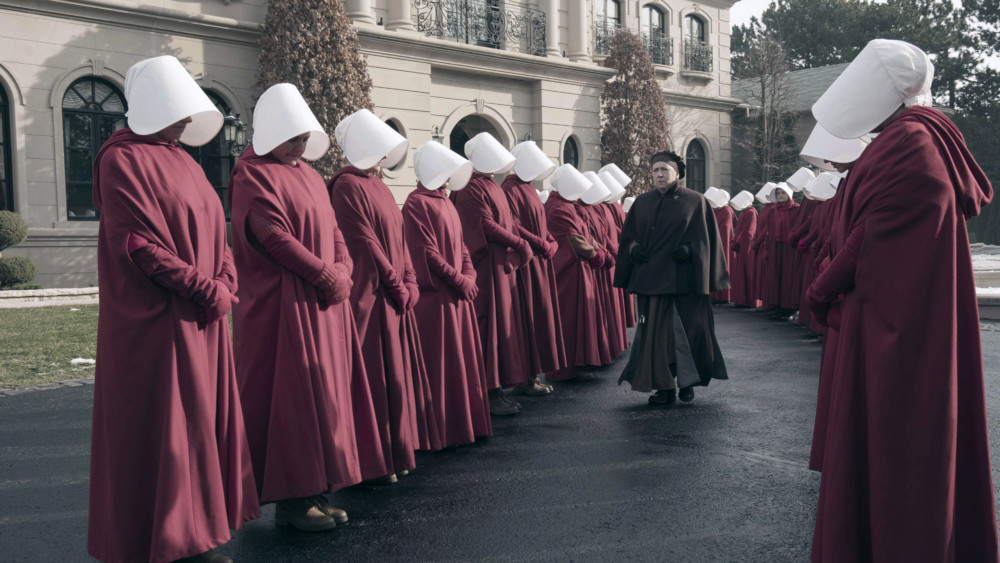By Lorraine Ali
Los Angeles Times
WWR Article Summary (tl;dr) When it comes to the year in entertainment, Columnist Lorraine Ali puts it best, “Scripted programming with strong, smart and poignant female narratives arrived like a swaggering, pissed off Jessica Jones, obliterating notions that nasty women were gone with Hillary Clinton’s candidacy.”
Los Angeles Times
Television asked a lot of us in 2017.
Keep up with nearly 500 scripted shows across multiple platforms, binge watch must-see series or risk spoilers, and consume enough news and late-night political satire to stay informed but not enough to lose it entirely and seek solace in “Murder, She Wrote” reruns.
In January alone that meant watching late night during the week, “Saturday Night Live” on the weekend, streaming “One Day at a Time” at work and filtering manic coverage of a brand new presidency.
American women staged nationwide protests and the new White House press secretary insisted that Donald Trump’s inauguration, not the Women’s March, drew the biggest crowd. “Period!”
The death of Mary Tyler Moore was nearly lost amid all the noise of men asserting their dominance over whomever they were trying to best, be it on Capitol Hill, “Real Time With Bill Maher” or “The O’Reilly Factor.”
Moore’s legacy being reduced to a footnote was a sad sign of the times. Her defining role as a beloved young professional who embodied the nation’s growing respect for smart, independent women was eclipsed by the same old “mine’s bigger” bluster.
It was clearly going to be a long year.
But something funny happened on that regressive trip back to the 1950s or whenever it was that America was greater than it is now. Scripted programming with strong, smart and poignant female narratives arrived like a swaggering, pissed off Jessica Jones, obliterating notions that nasty women were gone with Hillary Clinton’s candidacy.
Hulu’s “The Handmaid’s Tale” and “Harlots,” FX’s “Feud” and Netflix’s “Godless” all spoke to subjugated women outsmarting, if not blowing a hole through, the patriarchy.
It’s no coincidence that shows like these caused national conversations as powerful, accused sexual predators like Harvey Weinstein and O’Reilly fell.
The collective ADD we felt last year with the election coverage and onslaught of new shows that You Just Have to See! was somewhat remedied by a renewed sense of purpose in 2017’s lineup.
Even if the seventh season of “Game of Thrones” wasn’t a response to Trump’s admissions of sexual assault on that “Access Hollywood” tape, the return of its former female victims as armor-clad warriors and rulers felt like victory. Same goes for “Stranger Things.” Forget passively watching Christmas lights for signs of her son’s whereabouts, Joyce was out for Demogorgon blood.
That power dynamic extended beyond dramas. “SNL” became relevant again, which had as much to do with Melissa McCarthy and Kate McKinnon riffing on the entitlement of men like Sean Spicer and Jeff Sessions as it did Alec Baldwin portraying a self-aggrandizing commander in chief.
The sheer volume of shows made by, starring or telling the stories of women was both astounding and, yes, at times overwhelming. HBO’s “Insecure” and “Big Little Lies.” Showtime’s “SMILF.” Netflix’s “Alias Grace” and “The Crown.”
In its last season, “Scandal” still represents a remarkable breakthrough in a traditionally white, male medium. And in any other era, “The Deuce,” HBO’s drama about the 1970s sex trade in New York, would’ve been presented through the male gaze. We would have never known how different the porn industry looks through a woman’s eyes.
“Wonder Woman” touched down on the big screen, and “Supergirl” Jessica Jones returned to the small one. Their mission is still to save mankind, though in 2017, there seemed to be fewer men worth saving. At least in the media.
The year’s multiple accusations against powerful men, and the accounts of their alleged sexual misconduct, were often egregious enough to make “Game of Thrones” brothel owner Littlefinger, who got his own comeuppance at the hands of women he once manipulated, blush.
But more remarkably in 2017 was that the accusers were finally being heard, felling personalities too big to fail: Matt Lauer, Charlie Rose, Kevin Spacey, Louis CK.
Half of Hollywood seemed swept up in the #MeToo tsunami, which compelled Samantha Bee, one of the few female late-night hosts, to defend her reputation in the entertainment community.
“I can tell you one thing: There is a 1 million … percent guarantee that I’ve never shown my [penis] to anybody in my office!” Bee joked recently.
It’s a punchline that’s now funny thanks to all the female voices that changed the course of scripted TV, and American culture, in 2017, a year that ended with the astounding and televised defeat of another symbolic figure with the name Moore.














































































































































































































































































































































































